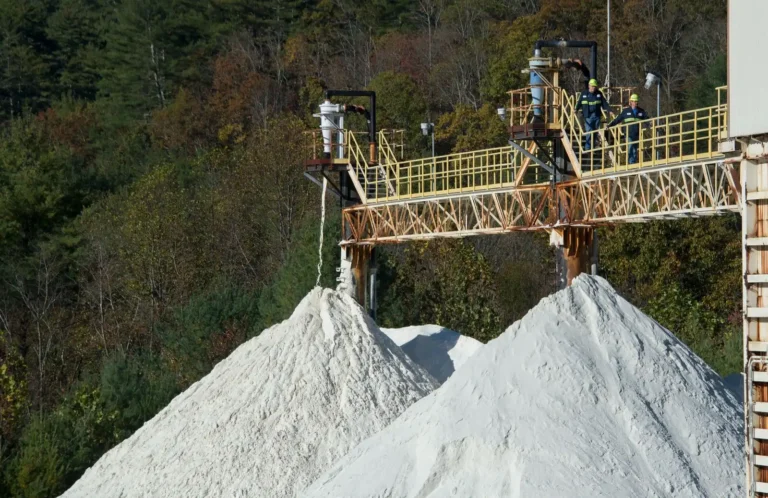Hurricane Helene has wreaked havoc across the US South, leaving millions without power and forcing evacuations. While the immediate human impact is devastating, the storm’s long-term effects could ripple through global technology supply chains. At the heart of this potential crisis lies a small town in North Carolina that plays a crucial role in the production of our everyday tech devices.
The Hidden Tech Hub of Spruce Pine
Nestled in the mountains of western North Carolina, about an hour northeast of Asheville, sits the unassuming town of Spruce Pine. With a population of just 2,000, you might not expect this rural community to be a linchpin in the global tech industry. However, Spruce Pine is home to the world’s largest known source of ultrapure quartz, also called high-purity quartz (HPQ).
Why does this matter to you? HPQ is a critical raw material used in the production of semiconductors—the fundamental building blocks of modern technology. These tiny electronic components power everything from your smartphone and laptop to electric vehicles and advanced military equipment. In fact, HPQ drives a $500 billion microchip industry that forms the backbone of the $3 trillion global tech sector.
What makes Spruce Pine’s quartz so special is its extraordinary purity. While quartz is the second-most abundant mineral in the Earth’s crust, finding economically viable deposits of HPQ is rare. The unique geological processes that formed Spruce Pine’s deposits over millions of years have created a material with properties ideal for high-end tech manufacturing.
The Impact of Hurricane Helene
As Hurricane Helene battered the southeastern United States, it brought extreme downpours and flooding to North Carolina. This severe weather has forced the two main mining companies operating in Spruce Pine—Quartz Corp and Unimin (a subsidiary of SCR-Sibelco)—to temporarily halt operations.
The immediate concern is the physical damage to the mining facilities and surrounding infrastructure. Flooded roads, damaged equipment, and power outages could keep these critical mines offline for an extended period. There’s also the potential for landslides in the mountainous terrain, which could further complicate recovery efforts.
But what does this mean for the tech industry and, by extension, for you as a consumer?
Potential Ripple Effects on the Tech Industry
The shutdown of Spruce Pine’s quartz mines could have far-reaching consequences for global tech supply chains. Here’s why:
- Limited Supply: Spruce Pine supplies approximately 70% of the world’s naturally occurring HPQ needed for computing devices and products. This market dominance means there are few alternatives available in the short term.
- Critical Applications: HPQ is used to manufacture crucibles for semiconductor production and components within the semiconductors themselves. Its unique properties—including high temperature and corrosion resistance, low thermal expansion, and high insulation—make it essential for advanced computing systems, especially in sectors like military technology, healthcare, and quantum computing.
- Global Dependencies: The tech industry relies heavily on a steady supply of HPQ from Spruce Pine. Any disruption to this supply could potentially slow down or halt the production of semiconductors, which in turn could affect the availability and prices of consumer electronics and other tech products.
While some experts suggest that manufacturers likely have stockpiles that could provide a buffer against short-term supply disruptions, the situation becomes more concerning if the mines remain offline for an extended period. Tom Bide, a senior scientist at the British Geological Survey, estimates that serious impacts could be felt if the disruption lasts longer than a month.
It’s important to note that the severity of the impact will depend on how quickly operations can resume. The mining companies are working closely with local authorities to safely restart their facilities as soon as possible. However, the extent of the damage and the challenges of recovery in a post-hurricane environment remain unclear.
Related Stories
Looking Ahead: Resilience in Tech Supply Chains
The situation in Spruce Pine highlights the vulnerability of tech supply chains to natural disasters and geopolitical events. As climate change increases the frequency and intensity of extreme weather events, the tech industry may need to reevaluate its reliance on geographically concentrated resources.
This event may serve as a wake-up call for tech companies and policymakers to invest in:
- Diversifying sources of critical raw materials
- Developing more resilient supply chain strategies
- Advancing recycling technologies to reduce dependence on newly mined materials
- Exploring synthetic alternatives to naturally occurring HPQ
As consumers, while we may not see immediate effects on our day-to-day tech use, this event underscores the complex global networks that support our digital lives. It’s a reminder of the importance of sustainability and resilience in our increasingly tech-dependent world.
The coming weeks will be crucial as we assess the full impact of Hurricane Helene on Spruce Pine’s ultrapure quartz mining operations. While it’s too early to predict the long-term consequences, this event serves as a stark reminder of the delicate balance between nature, technology, and global commerce.




Comments are closed.